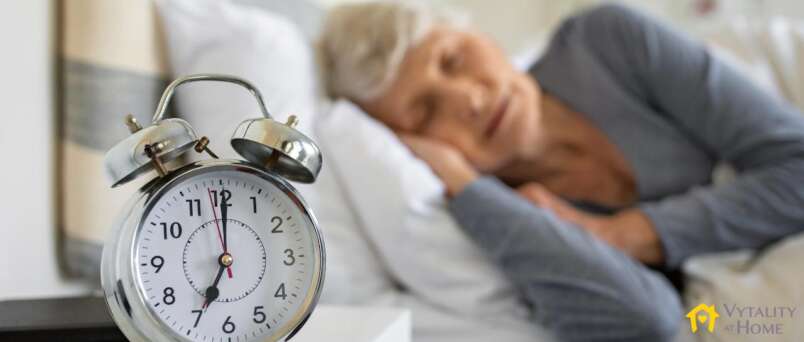To sleep, perchance to dream: top tips on better sleep for seniors
Sleep is something we all take for granted – until we have a problem with it! In this updated article, we include some of the latest information on sleep for seniors, and update our top tips for better sleep.
How much sleep do we need?
As we grow older, do we need more sleep, or less? The answer is neither. In fact, we all need the same amount of sleep throughout our adult lives, between 7 and 9 hours a night.
According to Statistics Canada, Canadians aged 65 and older have an average of 8.1 hours sleep per night. However, only 55% met the recommended sleep duration above and only 61% of Canadians rated their quality of sleep as good.
In a 2023 study, a team from McGill University looked at what an average day looked like for people in 58 different countries. It showed that the average human spends 9 hours a day asleep, but as the study’s author Professor Eric Galbraith said, this figure can be misleading:
“Children can snooze for up to 11 hours on average, while adults usually sleep for just 7.5 hours. (The 9 hours) also includes time in bed and not sleeping, which can be as much as one hour per day.”
Does our sleep change as we age?
The answer is yes and no. Past the age of 65, it’s more about the quality rather than than quantity of our sleep. According to Dr David Lee, a member of the World Association of Sleep Medicine:
“Sleep patterns change as you get older. The brain stem – that controls sleep – doesn’t work quite as well. So, your ability to get off to sleep, fall into deep sleep and maintain your sleep is reduced. Older people feel less satisfied with sleep because the depth just isn’t there any more.”
What may change as we get older is the time we go to bed. Seniors often retire to bed earlier, and rise earlier than when they were younger. In addition, getting to sleep may be more difficult in our later years due to the effects of medications, when we eat, if we take a nap, or nagging aches and pains.
However, the results of too little sleep or poor quality sleep will affect us as much as it ever did when we were younger. We might be irritable the next day, not think clearly, or generally feel tired. Lack of sleep can also contribute to the risk of falls, and long-term can increase the risk of health problems including high blood, pressure, diabetes, and cardiovascular problems.
The good news is that there are ways that all of us can improve both the duration and quality of our sleep with small changes to our daily routine.
If you have persistent insomnia (trouble falling asleep and/or staying asleep), or suspect you might have a sleep disorder, you should consult your doctor.
8 tips for healthy sleep habits
Try these top tips for better sleep.
- Set a sleep schedule
Aim to go to bed and get up at the same times every day of the week, even at the weekend. Setting a regular routine helps maintain your internal body clock, and our body and our mind respond well to routine.
“The biological clock is a tiny structure in the hollow of our brain. It modulates our body’s temperature and the levels of several hormones, such as melatonin and cortisol, on a 24-hour schedule.”
- Develop a regular bedtime routine
The time spent preparing to fall asleep is important to relax both body and mind. Many seniors enjoy reading a book and listening to gentle music to help them relax and drift off to sleep. However, watching TV or using a cellphone or tablet in bed is more likely to keep you awake. The blue light emitted by these devices blocks the release of the sleep hormone melatonin, making is much harder to fall asleep.
Other factors that can affect our ability to get to sleep include:
- alcohol
- nicotine
- caffeine
- eating late at night
Experts advise that you avoid all these in the two hours before bedtime. This list also includes hot showers or baths, as a raised core temperature can also affect your ability to sleep.
- Nap if you need to, but not for too long
If you need a nap in the afternoon, that’s fine, but limit its duration. Set an alarm to wake you after 30 minutes, for example, and make it a habit to get up and have a drink. This will prevent you sleeping longer, and potentially leaving you less able to sleep at night.
- Keep your bedroom cool
Make your bedroom a space dedicated to sleep as a cool and quiet place. A cool bedroom will help you sleep better because:
“If your bedroom’s temperature isn’t in the right zone and it’s too hot or too cold, then your body wastes energy on trying to regulate your body temperature. This leads to you tossing and turning and unable to settle down.”
A cool bedroom may also make you look younger as the temperature helps the body release melatonin, which can help your body fight the signs of aging as well as regulating your sleep!
- Eat your main meal in the middle of the day
At Vytality at Home, we’re firm believers in the benefits of eating a health meal at midday rather than at night, as you have more time to digest your food. Eating a large meal later in the day may prevent you falling asleep, and the same applies for drinking coffee or alcohol. Instead, eat a light supper and enjoy a milky drink before bedtime. For more on healthy eating, download this helpful guide.
- Keep your bedroom dark
Our timings on feeling awake or sleepy are largely due to the natural hormone melatonin. Our bodies release this hormone in response to light – when there is less light, we release more melatonin which makes us feel sleepy. So, a bedroom that is too light may keep us awake longer. Another tip is to get out into natural sunlight when you can during the day, to remind your brain that this is an awake time and not to release melatonin.
- Get at least 20 minutes of exercise each day
Exercise can help reduce anxiety and stress, and improve your quality of sleep. As we age, exercising for long periods of time can be come difficult. The good news is that just 20 minutes of exercise will help you sleep better, and this can be divided into 5-minute sessions if required. Exercise will also help with your overall health too, including losing weight, cardio health, keeping mobile and, if you attend a class, the social benefits too. Just don’t exercise less than two hours before going to bed, as this will raise your core body temperature.
- Be comfortable in bed
How old is your mattress on your bed? If it’s between 7 and 10 years old, it is coming towards the end of is lifespan. It does depend on what materials your mattress is made from, but having proper support and comfort in bed will help you sleep better. You may require a different level of support that previously, and you may also consider other options such as beds that raise you up so you can get on and off the bed more easily.
More health benefits of sleep
Sleep isn’t just about rest from physical activity. It also plays a vital role in our overall health, as Sleep On It Canada explains:
“Sleep plays a role in the preservation of the immune system and helps to regulate almost all the functions of our body: from the brain, heart and lung activity, to metabolism and the endocrine system. During sleep, the brain also removes the metabolic waste it produces during the day.”
Sleep and family caregivers
If you’re the full-time family caregiver for a partner, relative or disabled person, you also need your sleep. If you’re suffering from sleep deprivation, our caregivers can help. We offer respite care of family members so they know their loved one is well looked after, and allows them to have a proper night’s sleep.
Need our help?
Just contact us – we’re here to help you and your loved ones with a whole range of home care services, including respite care.




